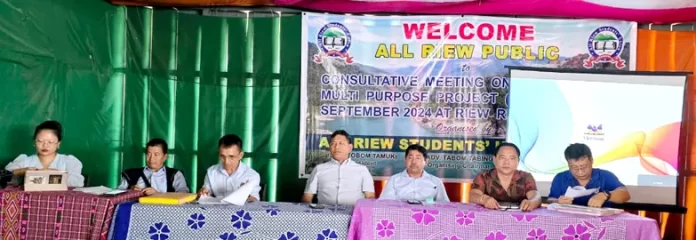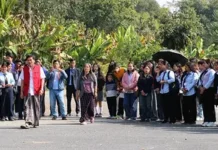Consultative meeting on SUMP
RIEW, 16 Sep: The Siang Indigenous Farmers’Forum (SIFF) has reiterated its objection to the proposal of preparing a pre-feasibility report (PFR) for the proposed Siang Upper Multipurpose Project (SUMP) by the NHPC Ltd, during a consultative meeting on the SUMP organised by the All Riew Students’ Union here in Siang district on Sunday.
Attended by Rural Development Minister Ojing Tasing, SIFF members, NHPC’s representatives, the hydropower chief engineer, Adi Baane Kebang (ABK) members and general public, the meeting sought to provide a platform to both the pro- and anti-dam parties to voice their opinions on the contentious issue.
Anti Mega dam activist Bhanu Tatak objected to the proposal of preparing a PFR for the dam by NHPC Ltd’s General Manager Amar Nath Jha, who stated that the Siang dam relief and rehabilitation (R&R)package would be discussed after the completion of the detailed project report (DPR).
Tatak stated that taking consent of the villagers only after completion of the PFR and DPR would merely be a protocol and a complete disregard of the anti-dam protests over the Siang river, “which has been going on for over 40 years.”
She also strongly objected to the alleged intimidation by the Upper Siang and the Siang deputy commissioners to the gaon buras and government employees who had opposed the proposed Siang dam and the notification of survey by the NHPC.
She further stated that the ABK should have consulted the public before allowing the PFR/survey for the dam.
“The public representatives may consider alternatives like community-owned renewable energy initiatives,including decentralised power grids and localised smart grids,” Tatak proposed.
Citing the Great China quake in 2008 that was triggered by the Zipingpu dam due to overload, and the recent dam burst in Sikkim due to a glacial lake outburst flood on 4 October, 2023, Tatak questioned the feasibility of the SUMP and raised the compensation issue with regard to the Siyomi and the Dibang dams, as well as non-compliance of forest clearance for the Dibang and the Subansiri dams.
She further claimed that “China will also object to dam building on Siang and it poses an equivalent threat to the national security and the people of the area.”
Senior advocate Nalo Pada also strongly objected to the alleged intimidation of GBs and government employees by the Upper Siang and the Siang DCs. “They are raising voice against destruction of their properties and rampant way of disturbing ecological balance; they are not protesting the government policy,” Pada said, and emphasised that “the mandate of the affected people on the proposed dam must be respected.”
Advocate Tabit Tapak stated that the matter of land compensation has received mixed reactions from the affected people “because majority of them are strongly against construction of a mega dam on the Siang river.” He urged the government to “remain more transparent if it wants to take the people’s consent with regard to the proposed dam.”
Earlier, the RD minister addressed “the public’s misconception” regarding his position on the proposed dam. He emphasised the potential benefits that the dam could bring to the region, including development, opportunities, and economic uplifment.
NHPC Pasighat General Manager Amar Nath Jhapresented the technical aspects of the dam, assuring the stability of the proposed project. He emphasised that “China has already begun constructing a hydropower project on the Yarlung Tsangpo river with a massive 60GW installed capacity.
“To counter any potential risk from breaches of this dam, including flood risk and water security issues, the government of India is planning to construct a hydropower project on the Siang, which will have a storage capacity of 9.2BCM and will be crucial for water security, strategic importance and flood moderation,” he reasoned.
Hydropower Chief Engineer (M) Atek Miyu stressed on the potential consequences if the dam is not constructed, “particularly in terms of the risks posed by China’s project upstream.” He encouraged local student unions to hold consultative meetings, and said that “the youths are the most knowledgeable and capable of weighing the pros and cons of the dam for their community.”
RTI Commissioner Vijay Taram in his address highlighted the R&R plan and urged the project affected individuals to “negotiate a fair compensation package with the government if the current terms are unsatisfactory.”



